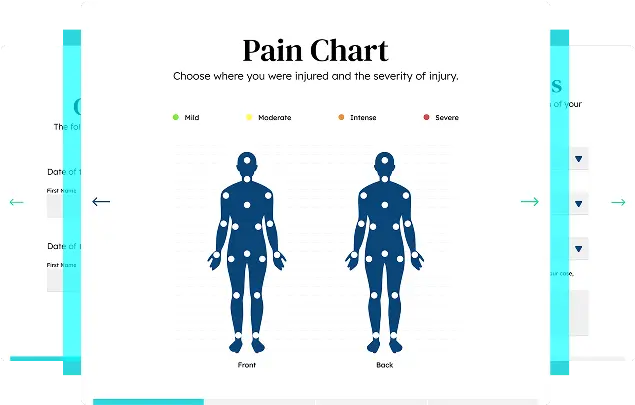Abogado de Resbalones y Caídas de Boston
Nuestros abogados de resbalones y caídas de Boston comprenden cómo estos accidentes pueden cambiar su vida. Lo apoyamos en todo el proceso legal para que pueda obtener la compensación que necesita para su recuperación
Obtenga Asesoramiento Gratuito Sobre la Compensación Que Merece
Inicio » Abogado de Lesiones Personales en Boston » Abogado de Resbalones y Caídas de Boston
Revisado Por: Christopher DiBella
marzo 31, 2025
Si Cayó en La Propiedad De Otra Persona, Es Posible Que Tenga Una Reclamación
Los propietarios de propiedades y negocios en Boston tienen la responsabilidad de mantener sus propiedades en condiciones seguras para sus invitados y el público en general. Esto incluye mantener todas las superficies y pasillos, tanto en interiores como en exteriores, libres de peligros. Cuando no lo hacen y alguien se cae, el propietario negligente puede ser considerado legalmente responsable de los gastos médicos y otros gastos relacionados con la lesión del afectado.
Si resultó herido debido a un resbalón y caída en Boston, debe hablar con los abogados de responsabilidad civil en DiBella Law Injury and Accident Lawyers. Nuestro equipo de profesionales discutirá su situación durante una consulta gratuita para ayudarlo a determinar si la negligencia jugó un papel en sus lesiones. Llame hoy al (617) 663-0665 para programar una cita y conocer sus derechos.
Peligros en Los Pasillos
Hay muchos obstáculos que pueden aumentar el riesgo de un resbalón y caída. Los pisos irregulares pueden crear un peligro de tropiezo. Las transiciones de un tipo de piso a otro, o las puertas que están desiguales, deben estar claramente marcadas. Las alfombras y tapetes deben estar asegurados al piso para evitar tropiezos. Los escombros nunca deben dejarse en pasillos, pasillos, escaleras o en áreas utilizadas para el tráfico peatonal. Todos estos son peligros previsibles que podrían dejar al propietario de la propiedad responsable si alguien se tropieza y cae.
¿Quién Es Responsable De Su Lesión?
En el Commonwealth de Massachusetts, los propietarios de propiedades tienen la obligación de proporcionar a sus invitados, inquilinos y clientes un entorno seguro y libre de peligros. Esto incluye aceras, escalones al aire libre, escaleras interiores, pasillos, pisos y habitaciones. Los propietarios de propiedades pueden ser considerados responsables de la mayoría de las lesiones que eran previsibles pero que no se previnieron. Esto puede incluir a alguien tropezando con basura o escombros dejados en el camino, cayendo por escalones empinados sin pasamanos, o resbalando en una fuga de plomería que gotea en el piso del baño. Para determinar si un propietario de propiedad ha sido negligente y causó su accidente, consulte a los abogados de responsabilidad civil en Boston de DiBella Law Injury and Accident Lawyers.
Hemos brindado apoyo y orientación fundamentales a personas que han sufrido lesiones, garantizando su bienestar financiero y emocional.
Responsabilidad De Los Propietarios De Propiedades en Boston Durante El Invierno
El clima invernal en Boston trae consigo una variedad de condiciones que pueden crear peligros de caídas. Massachusetts requiere que los propietarios de propiedades eliminen la nieve y el hielo de sus pasillos dentro de un tiempo razonable. Esto significa que los propietarios de viviendas deben mantener sus aceras de manera segura mediante la pala o la aplicación de sal o arena si es necesario. Los propietarios de propiedades comerciales deben eliminar la nieve y el hielo personalmente o a través de una empresa de remoción de nieve contratada. Los propietarios de propiedades también pueden ser considerados responsables si no hay materiales absorbentes como alfombras o tapetes en las entradas y salidas, donde el agua puede acumularse y crear un peligro de resbalón para cualquier persona que ingrese al edificio.
Obtenga una evaluación inmediata de su caso sin costo ni obligación en menos de 5 minutos.

Qué Hacer Después De Un Accidente De Resbalón y Caída
Buscar atención médica debe ser la primera prioridad para cualquier víctima de resbalón y caída. Si no puede moverse o sospecha de lesiones graves, llame al 911 y permanezca quieto hasta que lleguen los primeros respondedores. Nunca mueva a una víctima a menos que esté en peligro inminente en la ubicación actual. Es importante documentar la escena lo mejor posible con fotos de la condición peligrosa, sus lesiones y cualquier nota que pueda ser útil. Si puede intercambiar información de contacto con alguien que presenció el accidente, su testimonio podría ser útil en caso de una demanda.
Después de un resbalón y caída, comuníquese con el equipo de DiBella Law Injury and Accident Lawyers al (617) 663-0665 lo antes posible para programar una consulta gratuita sobre cómo puede buscar compensación por sus lesiones. Entendemos que puede ser frustrante intentar llegar a un acuerdo equitativo con los propietarios de propiedades, sus abogados e incluso propietarios de viviendas que no quieren pagar. En DiBella Law Injury and Accident Lawyers, utilizaremos nuestra experiencia para asegurar la compensación que usted merece como víctima de la negligencia de otra persona. Hable con nuestros abogados de lesiones personales en Boston hoy.
